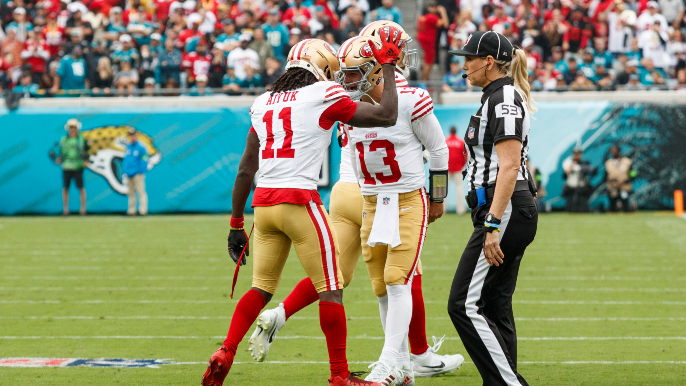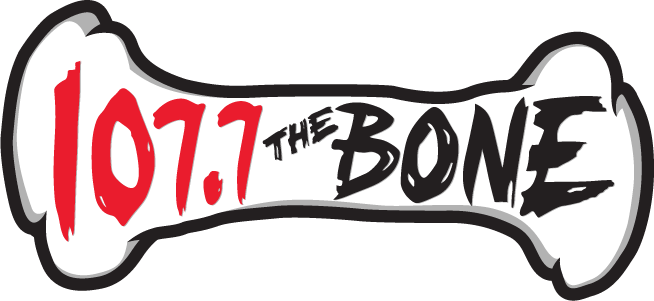
Brock Purdy pulled off the ultimate, “No, no, YES!” play in Jacksonville two weeks ago.
He rolled left and tried to direct George Kittle to the far left pylon. Instead, Kittle and Brandon Aiyuk ran to the same spot, bringing their defenders with them to the back of the end zone. Purdy, by some magic, luck, skill, or combination, feathered the ball over the defenders for Aiyuk, and only Aiyuk, for the opening touchdown.
Kyle Shanahan was immediately critical of the play.
“I can say this because he played his ass [off], that was one of his worst decisions I think he’s made since he’s been here,” Shanahan said. “It took me a while to get over it, but I thanked him for the touchdown. But that was not a good decision. He was fortunate with it, but he made a lot of really good plays and if you are going to make a bad decision and it’s still a touchdown… in the grand scheme of things he can tell me it was a really good decision.”
Purdy agreed with the assessment, saying he was aware it was not a smart decision.
But there is an argument to be made — even if it’s a tenuous one — that it was a throw borne out of trust and an understanding of Aiyuk’s tendencies.
Maybe that’s a stretch, at least on that play. But the consistent connection between Purdy and Aiyuk — whose future contract is climbing higher and higher in the $20-30 million per year range — has established a vertical threat this offense has not had with any consistency. That’s in addition to the intermediate and short-range staples that are still working.
Never was that more clear than on the 76-yard touchdown Purdy laid out to Aiyuk against Tampa Bay for the longest receiving play in the NFL this year. Aiyuk won clean on a slot fade and Purdy put it in his lap for a house call.
He finished the game a career-high 156 yards on five catches. With 831 yards this year, he is on pace to crack 1,000 yards again, and demolish his 1,015-yard total from last season.
Aiyuk, by just about any metric, has been dominant. ESPN’s wide receiver tracking metrics rate Aiyuk as the second-best receiver in the NFL at getting open, behind only Keenan Allen. Aiyuk is graded by those metrics as the third-best receiver in the league. Granted, they rank Tyreek Hill — a borderline MVP candidate — tied for 17th overall, so they may need some tweaking.
But the point remains that Aiyuk is tearing up coverage and Purdy is putting the ball on him, repeatedly. While that can simply be chalked up to great route running and quarterback play, both Aiyuk and Purdy pointed Tuesday to one factor in their connection: Purdy’s understanding of the way Aiyuk likes to run his routes.
You hear a lot about how great quarterback-receiver pairings have an instinctual, almost twin-like understanding of each other’s tendencies. But that explanation doesn’t usually pay dues to the time and work those connections take to develop, let alone the detail.
Aiyuk said Tuesday that Purdy’s feel — from “weeks and weeks” of “just working” — for what his route running is what makes them so dangerous.
“I just think he has a good feel for how I want to run my route on certain looks and where I might end up,” Aiyuk said. “He has good feel of feeling off receivers. I think that helps his accuracy even more because he can feel what we’re doing.”
Purdy wholeheartedly agreed.
While he’s shown improved arm strength this season, with Deebo Samuel joking that he’s “been lifting a little weights,” Purdy won’t ever have the natural arm talent to do some of the things that freaks of nature like Patrick Mahomes, Josh Allen, Lamar Jackson and Justin Herbert are capable of.
What it really means is that he has to play with elite anticipation to make up for a lack of an elite fastball. And he does, consistently.
“Throwing with anticipation is huge for me,” Purdy said. “And so [Aiyuk] understands that and when I let the ball go he gets to where it needs to be and we’ve made it happen.”
Purdy discussed the work he’s put in studying his own receivers. It revealed just how granular he gets, and the self-scouting required to understand the nuances within the 49ers’ outrageous arsenal.
He pointed towards Aiyuk’s traits of speed, length and range as putting consistent pressure on defensive backs. Coupled with his ability to get out of breaks “on a dime,” unlike some other receivers, it takes pressure off Purdy.
When I got back [from surgery], it was just studying how B.A. runs, how he breaks in and out of breaks. He’s different from Deebo. He’s different from George. And so sort of just taking note of that. And then B.A.’s just got length, man. He’s got range. So knowing I know where he can get to and where I shouldn’t throw the ball and where he’s not going to be…
Certain breaks, there’s receivers that run up and chop chop and then break out so it may take another hitch or so.
With B.A., I feel like he can cut on a dime and get in and out of things pretty quickly. Just his speed, his explosion off the line, gets DBs to push back and that makes it easier too to create separation.
And as a quarterback, I can sort of see where he’s going to be. Makes it easier for me. So those are little things I mean as a quarterback, what you look and study for on film.
When Purdy is criticized, it is generally centered around the thesis that he has an elite playcaller and elite weaponry. Both of those things are true.
It helps massively to be able to hit Christian McCaffrey for a checkdown that becomes a miraculous first down.
But what is also true is that Purdy has made a concerted, and successful effort, to understand the weapons at his disposal, and to maximize them.
He also has an off-schedule playmaking ability that sometimes waffles between disaster and the inch-perfect wizardry that came on his opening touchdown to Aiyuk in Jacksonville. Part of that success is knowing his receivers.
And for the the first time under Kyle Shanahan, the 49ers’ offense is taking and hitting deep shots.
Purdy’s is leading the NFL in completed air yards per attempt (5.3 yards), and is converting more than anyone else at a league-best 9.7 yards per attempt (Tua Tagavailoa is second at 8.5 yards per attempt). He also leads the league in EPA (expected points added) on throws more than 10 air yards (+0.87 EPA).
By any assessment, that is worth taking seriously. And at the core of that — hitting plays downfield — is Purdy’s understanding of Aiyuk.

